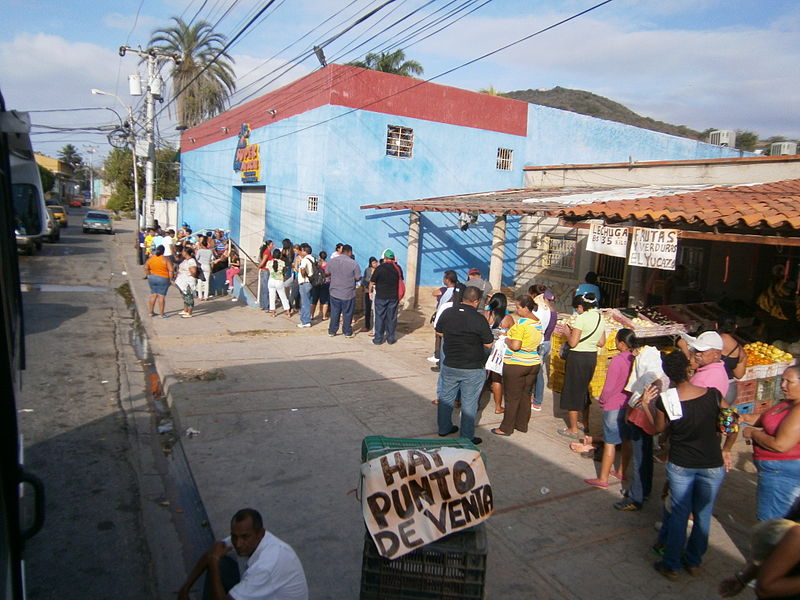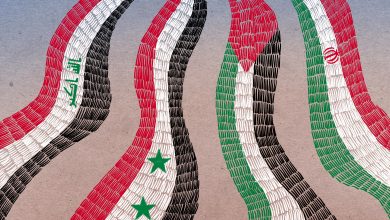Teenage Pregnancy on the Rise: How Venezuela’s Economic Crisis Has Led to Inadequate Reproductive Health

Escasez en Venezuela, Photo via Wikimedia Commons/ Public Domain
Today in Venezuela, cuts in social programs, severe food and medicine shortages, skyrocketing crime rates, and raging protests mark the severe economic and political crisis that has plagued the country since the oil price drops of 2014. However, the shortage in available birth control particularly underscores many devastating effects of this crisis.
In Venezuela, one out of every four infants are born to a teenager, according to the United Nations Population Fund. This number is in part due to Venezuela’s currently destabilized economy, which has relied almost exclusively on their rich oil reserves and revenues for decades. After oil prices dropped in 2014, so too did Venezuela’s social programs and food subsidies that heavily relied on such revenues. The nation’s oil-dependent economy, fueled by government-owned oil projects expropriated from private businesses, suddenly collapsed, leaving Venezuela in a state of panic.
The Centre for Documentation and Social Analysis (CENDAS) reported that, in March 2017, a family of five needed 1.06 million bolivars,” which amounts to about $42 U.S. dollars, “to pay for basic goods for a month.” This includes “food and hygiene items, as well as spending on housing, education, health and basic services.” After these social programs and subsidies became unsustainable, access to basic needs –food, medicine, welfare, and contraceptives– all but disappeared. Thousands of Venezuelans now worry about feeding themselves and their families that are growing due to unwanted pregnancies.
For women like Darnellys Rodríguez, a mother of 2 children, this lack of options is a huge detriment to them and their families. In a BBC interview with Rodríguez, she said, after finding out about her third unplanned pregnancy, “My first reaction was to cry.” Having gotten pregnant to her first child at the age of 15, Rodríguez knew what having another child would do to her and her loved ones’ well-being.
She elaborated further, saying, “Getting contraceptive pills is really hard. There’s nothing and when you can get hold of them, the cost is beyond my reach.” She spoke of plans to get sterilized, as the idea of having more children would hinder her ability to take care of her family.
Rodríguez’s story is a common narrative for many women in countries where reproductive health and rights are restrictive and financial resources are scarce.
This shortage is compounded by the fact that abortions are illegal in Venezuela, with the exception that the mother’s life is at risk. This shortage has led many women to attempt to terminate their pregnancies, often in dangerous ways. Marissa Loretto, an OB/GYN in Caracas, Venezuela, recently had to perform a hysterectomy on a woman who attempted an abortion by stuffing parsley and laundry detergent into her uterus.
Doctors attribute these high levels of unwanted pregnancies and sexually transmitted diseases as another layer to Venezuela’s political and social turmoil. Dr. Huniades Urbina Medina, the president of the Venezuelan Society of Childcare and Paediatrics, blames this public health emergency on the government, saying that the government, instead of teaching adolescents sex education, give them money and other subsidies, such as housing. He concludes that, “a teenager thinks if she gets pregnant, she can leave her house and become an adult.”
While this attitude toward teenage pregnancies in Venezuela justifiably blames the government for their neglect, it problematically assumes that these adolescent mothers are frivolously ignoring their sexual health in order to “game the system” and collect government handouts. What makes the high number of teenage pregnancies in Venezuela even more concerning is the growing rates of child malnourishment in the country.
More and more women are turning to desperate means for controlling their fertility and reproductive capacities, seeking contraceptives through black market ties and even considering sterilization as a solution. In a country where infant mortality rates are as high as 30%, crime rates are at their highest in history, and the presidential administration refuses to address its people’s strife, the reasons why Venezuelan women are seeking risky solutions to unwanted pregnancies are clear. These women are seeking any possible means to survive and care for their existing families.
Often in developing countries, where proper reproductive health and education is already a rarity, women are tasked with the primary responsibility to access birth control and to practice family planning. However, with Venezuela’s deteriorating economic and political status, the ability to continue these practices are becoming increasingly difficult, as contraceptives are virtually nonexistent in pharmacies and the black market prices for said contraceptives are soaring high.




